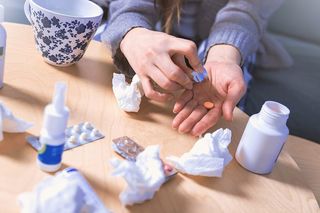Coronavirus Disease 2019
Will the Coronavirus Finally Keep People Home When They're Sick?
Recommendations for self-quarantine have existed for decades, with few abiding.
Posted April 7, 2020

When I closed the doors to my physical therapy office last spring and transitioned to a fully online practice, my feelings were mixed, to say the least. I was thrilled to cut out my commute, have more energy and time to devote to writing books, teaching classes, and doing all the things that make me a fulfilled and immensely grateful psychologist. Upon a few months of the transition, I even wrote about some of the immediate benefits I saw for both my clients and myself as a therapist. One of the factors that I mentioned that is far more relevant today than ever before, is keeping sick clients at home.
I will never forget one of my earliest clinical rotations while a graduate student at the University of Notre Dame. I was fortunate to be working in the university counseling center with some of the most talented and kind human beings I’ve ever met in my life. As a beginning therapist, there was, of course, some trepidation. After all, how do you “do” therapy? After the initial assessment session where you ask a million questions, how do you fill 45 minutes? What if there are awkward silences? The possibilities for failure felt endless.
But one of the sessions that was most unexpected was a student who came in for session saying she had just been put on quarantine by the health center doctor due to testing positive for mono. In full disclosure, I am somewhat of a self-diagnosed germaphobe/hypochondriac at times. Mono? Contagious? My mind raced. I had heard of it as the “kissing disease,” but something about even being in three-foot proximity (as therapy offices are often set up) gave me severe anxiety. I managed to convince her that therapy could wait as she was not in crisis and that we could resume sessions once her physical health was more stable.
In retrospect, I am not convinced one way or another that I handled it poorly or well. Quarantine by doctor’s orders in your dorm room means quarantine. Are mental health services necessary? It depends, and can honestly go both ways depending on severity and symptomology. But in light of the recent pandemic, I can’t help but return to the first time this happened in my office. Across the years I’ve had countless young clients come in with active fevers, having just come from the hospital and ER the night before, and severe GI issues only hours before.
Therapy offices are typically “cozy” to use a euphemism. Many don’t have strong ventilation systems or even operable windows. I’m sure at one point I likely passed along the norovirus from one of my patients to my husband when we were traveling; it was terrifying, to say the least, as I kept asking him if I should take him to an emergency room. Then there was last year and the “regular” flu epidemic. My father contracted it from a neighbor and wound up hospitalized for nearly a week.
There is no doubt that we have all been impacted by and at times guilty of showing up ill when we should have stayed home. Heretofore, we have globally accepted that “stay home if you’re sick” is more of a suggestion than a mandate. And we bend the rules liberally.
While I have always been on the anal “please get out now if you are or have been contagious within the last 24 hours” side of things, I also realize this makes me seem downright out of my mind to others. Maybe it’s because when I do fall ill, it’s typically pretty bad and my body rejects most meds pretty violently. So it’s been my go-to to attempt to stay as healthy and well as possible if for nothing other than to avoid antibiotics. But in working with immunosuppressed individuals, having elderly parents, and being aware of all of those who are vulnerable, it is even more clear why we need to start taking quarantining outside of a pandemic more seriously.
Now that “social distancing” is a part of our vernacular, I genuinely hope it sticks around for the entirety of our lifetime. I hope we take seriously how easily we may be asymptomatic and spreading our germs liberally without knowledge of doing so. I hope workplaces are more understanding and generous with sick policies, and that we actually start embracing technologies to bridge the gap when we must stay home. Doctor’s offices are using telemedicine more now than they ever have before. Schools are conducting sessions online.
I genuinely hope that if there is one tiny positive takeaway that we can glean from social distancing, quarantine, and the pandemic, it is to please stay home and take care of your body. As experts have been saying, public health is not a “me” issue, but rather about all of us.


